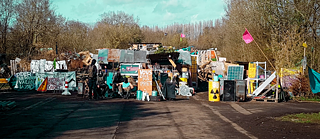Democratisation in the climate fight?
Climate Change and Social Struggles

Can we win the climate struggle in France? Three young activists share their views on the social, political and economic struggles.
By Victoria Berni
"As long as everything is geared to economic growth, we will not create a sustainable or just system." I can only agree with Asuka that green capitalism is not a solution to our climate crisis. Let's take a closer look at how climate and environmental activism relate to social justice in my country.
Something is happening in France right now that could mean a victory in the climate struggle. In October 2019, a brand new way of exercising democracy was launched: a Citizens' Convention for the Climate (Convention Citoyenne pour le Climat), in which 150 citizens drawn by lot have come up with measures to reduce France's greenhouse gas emissions by at least 40% by 2030.
Many institutions are nonetheless of the opinion that the legislation proposed by the French government in the wake of the agreement has undone the work of the citizens. The agreement was actually supposed to re-establish a democratic dialogue after the crackdown on the Yellow Vests movement, who have been protesting against a CO2 tax on fuel prices since November 2018. And this protest is perfectly understandable, considering that the CO2 tax in France weighs four times heavier on the budget of the poorest 10% than on the richest 10%, even though the latter pollute the environment far more.
For Elodie, the 32-year-old spokesperson for Alternatiba, "the yellow vests embodied the demand for social justice in relation to the climate. Since then, the climate movement has not only grown, but has also made connections."
A decolonial ecology of the lower strata of society for climate justice
In the wake of these connections, Alternatiba joined forces with Comité Adama on 18 July 2020 for a protest march against air pollution in working-class neighbourhoods and the police violence that led to the suffocation deaths of Cédric Chouviat, Lamine Dieng d'Adama Traoré and other victims of racial discrimination. In doing so, Elodie proclaimed, "The Adama movement and the climate movement stand for the same message: we want to breathe."This ecology of the lower strata of society fights against "the colonisation of working-class neighbourhoods by higher segments of the population" (Manon Vergerio). Gentrification pushes the socially weaker population to the outskirts of the city, to industrial sites, to an environment polluted by the main road arteries and run-down housing with low energy efficiency. To counter this phenomenon, Youth for Climate occupies houses for the socially vulnerable in the centre of Paris.
Business as usual behind the façade of liberal ecology
According to Maxime, the 24-year-old international coordinator of Extinction Rebellion France, it's about "getting to the root of the problems, which means being literally radical. This includes carrying out actions of civil disobedience against those sectors responsible for the destruction of life, social connections and democracy."In this sense, Total raised eyebrows in 2020 for denouncing a liberal ecology that engages in greenwashing while sticking to the same destructive economic model. Elodie explains: "Total wants to turn the Grandpuits refinery into a biofuel plant and lay off 200 people. The workers are aware of the consequences for the climate and they want to change jobs, but without the social destruction and greenwashing of Total, which continues to extract oil."
Maxime thinks that "we can achieve the necessary economic paradigm shift, for example, with an income that rewards ecological change, as Sophie Swaton proposes, to finance occupational change."
Global ecology under the banner of the cultural struggle
Elodie thinks that a cultural victory has already been won: "There is not a single political party in France in 2021 that does not talk about environmental protection, and all sectors want to be involved. The next goal is to move from an individual ecology to a global ecology." But this will require offers for an alternative way of life.With this vision, 26-year-old Romane began a dissertation on ecological places: "Is living differently a way to fight for a global ecology? We live in a lively, engaged community, are frugal and locally connected to the earth and our neighbours. We live what we believe. We try to get involved in local institutions. We wage a struggle in many different places. We welcome visitors to share and show that a different lifestyle is possible."
My fellow blogger Gabriele can moreover tell you how big Italian companies are becoming climate criminals without any legal consequences - and how we activists can respond. Curious? Then read his post next week!